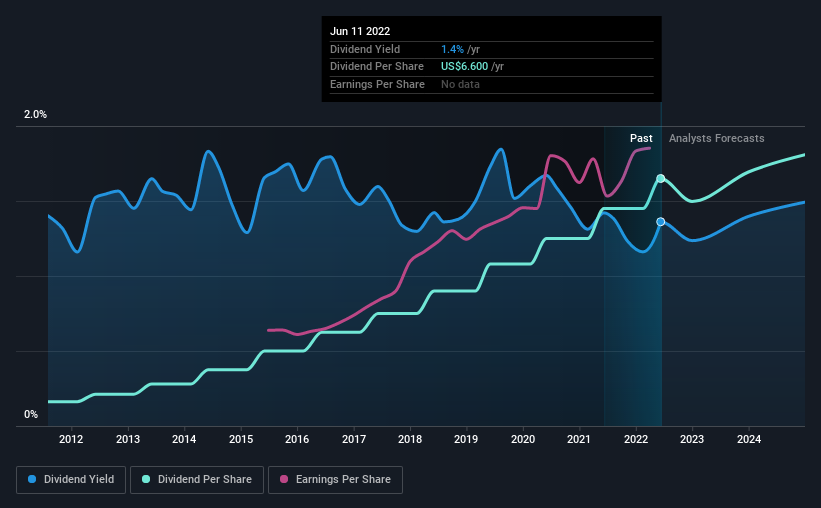Why You Might Be Interested In UnitedHealth Group Incorporated (NYSE:UNH) For Its Upcoming Dividend
UnitedHealth Group Incorporated (NYSE:UNH) stock is about to trade ex-dividend in 3 days. The ex-dividend date is one business day before a company's record date, which is the date on which the company determines which shareholders are entitled to receive a dividend. The ex-dividend date is of consequence because whenever a stock is bought or sold, the trade takes at least two business day to settle. Therefore, if you purchase UnitedHealth Group's shares on or after the 16th of June, you won't be eligible to receive the dividend, when it is paid on the 28th of June.
The company's upcoming dividend is US$1.65 a share, following on from the last 12 months, when the company distributed a total of US$5.80 per share to shareholders. Looking at the last 12 months of distributions, UnitedHealth Group has a trailing yield of approximately 1.4% on its current stock price of $484.63. Dividends are an important source of income to many shareholders, but the health of the business is crucial to maintaining those dividends. As a result, readers should always check whether UnitedHealth Group has been able to grow its dividends, or if the dividend might be cut.
Check out our latest analysis for UnitedHealth Group
If a company pays out more in dividends than it earned, then the dividend might become unsustainable - hardly an ideal situation. UnitedHealth Group paid out a comfortable 31% of its profit last year. Yet cash flows are even more important than profits for assessing a dividend, so we need to see if the company generated enough cash to pay its distribution. Fortunately, it paid out only 28% of its free cash flow in the past year.
It's encouraging to see that the dividend is covered by both profit and cash flow. This generally suggests the dividend is sustainable, as long as earnings don't drop precipitously.
Click here to see the company's payout ratio, plus analyst estimates of its future dividends.
Have Earnings And Dividends Been Growing?
Businesses with strong growth prospects usually make the best dividend payers, because it's easier to grow dividends when earnings per share are improving. Investors love dividends, so if earnings fall and the dividend is reduced, expect a stock to be sold off heavily at the same time. That's why it's comforting to see UnitedHealth Group's earnings have been skyrocketing, up 20% per annum for the past five years. UnitedHealth Group is paying out less than half its earnings and cash flow, while simultaneously growing earnings per share at a rapid clip. Companies with growing earnings and low payout ratios are often the best long-term dividend stocks, as the company can both grow its earnings and increase the percentage of earnings that it pays out, essentially multiplying the dividend.
The main way most investors will assess a company's dividend prospects is by checking the historical rate of dividend growth. UnitedHealth Group has delivered an average of 26% per year annual increase in its dividend, based on the past 10 years of dividend payments. It's great to see earnings per share growing rapidly over several years, and dividends per share growing right along with it.
The Bottom Line
Has UnitedHealth Group got what it takes to maintain its dividend payments? UnitedHealth Group has been growing earnings at a rapid rate, and has a conservatively low payout ratio, implying that it is reinvesting heavily in its business; a sterling combination. There's a lot to like about UnitedHealth Group, and we would prioritise taking a closer look at it.
While it's tempting to invest in UnitedHealth Group for the dividends alone, you should always be mindful of the risks involved. To help with this, we've discovered 1 warning sign for UnitedHealth Group that you should be aware of before investing in their shares.
A common investing mistake is buying the first interesting stock you see. Here you can find a full list of high-yield dividend stocks.
Have feedback on this article? Concerned about the content? Get in touch with us directly. Alternatively, email editorial-team (at) simplywallst.com.
This article by Simply Wall St is general in nature. We provide commentary based on historical data and analyst forecasts only using an unbiased methodology and our articles are not intended to be financial advice. It does not constitute a recommendation to buy or sell any stock, and does not take account of your objectives, or your financial situation. We aim to bring you long-term focused analysis driven by fundamental data. Note that our analysis may not factor in the latest price-sensitive company announcements or qualitative material. Simply Wall St has no position in any stocks mentioned.

 Yahoo Movies
Yahoo Movies 

